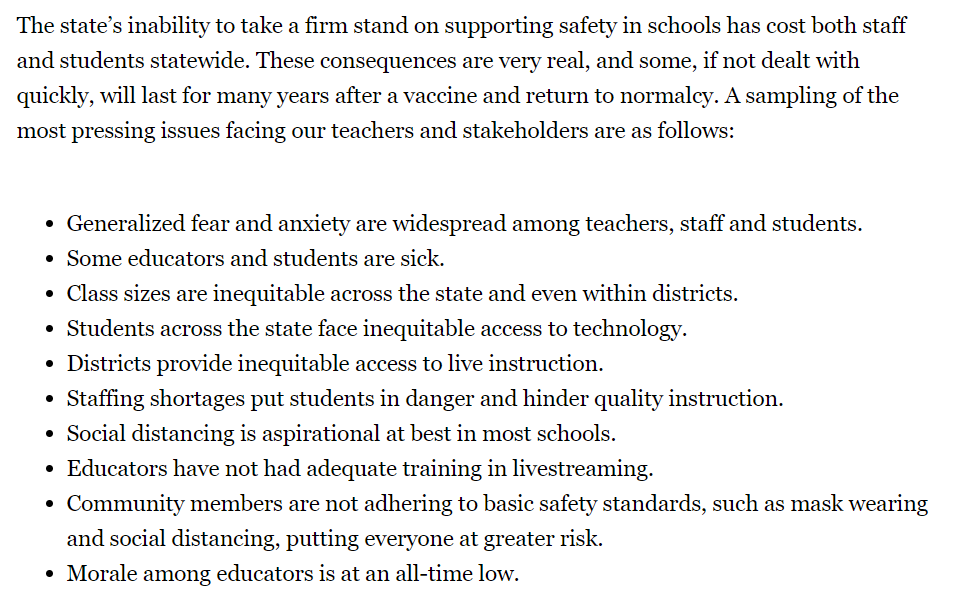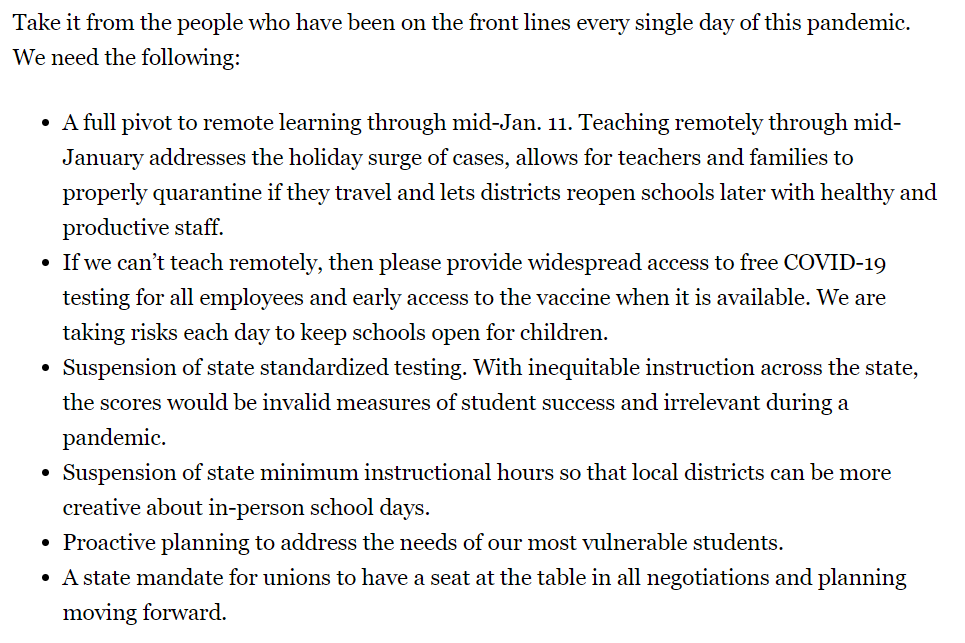My goodness, this op-ed from Fairfield County educators is all over the place, and seems to acknowledge the failures and inequities sown by virtual learning while... calling for more of it.
Let's take it point by point, shall we? https://twitter.com/alexanderrusso/status/1338573247768563716
Let's take it point by point, shall we? https://twitter.com/alexanderrusso/status/1338573247768563716
1/ They acknowledge in late Aug "COVID-19 numbers were low and that the data supported going back to school in person." Nevertheless, they accuse districts of making an "experiment out of our physical health, emotional well-being and student access to quality education."
2/ This is a direct admission that reduced community spread is not a sufficient condition for returning to the classroom for the authors.
They claim increased safety measures and better leadership are needed as well.
Here are what they consider to be the most pressing issues...
They claim increased safety measures and better leadership are needed as well.
Here are what they consider to be the most pressing issues...
3/ This list is a hodgepodge of things that fall into 4 categories:
1. Things that school districts have no way of solving. "Generalized fear and anxiety," "morale among educators" - how should districts solve? Would we accept this as reason for dereliction in other professions?
1. Things that school districts have no way of solving. "Generalized fear and anxiety," "morale among educators" - how should districts solve? Would we accept this as reason for dereliction in other professions?
4/
2. Legitimate concerns. These include how to handle sick students and staff, how to address staffing shortages, and what social distancing protocols are to be implemented. (Despite the "safety" lead-in, the social distancing bullet is the only one that touches it.)
Focus here!
2. Legitimate concerns. These include how to handle sick students and staff, how to address staffing shortages, and what social distancing protocols are to be implemented. (Despite the "safety" lead-in, the social distancing bullet is the only one that touches it.)
Focus here!
5/
3. Problems that predated the pandemic. Yes, class sizes are inequitable across districts. The solution isn't to deny in-person learning to kids from districts which face that problem, thereby exacerbating the inequity. Especially when your fourth category involves...
3. Problems that predated the pandemic. Yes, class sizes are inequitable across districts. The solution isn't to deny in-person learning to kids from districts which face that problem, thereby exacerbating the inequity. Especially when your fourth category involves...
6/
4. Reasons that virtual learning ISN'T working.
They are right: Students lack technology, and educators are not trained to provide quality instruction virtually. That's not the fault of teachers. But we need to weigh it against other factors to do what's best for the students.
4. Reasons that virtual learning ISN'T working.
They are right: Students lack technology, and educators are not trained to provide quality instruction virtually. That's not the fault of teachers. But we need to weigh it against other factors to do what's best for the students.
7/ Now, what are these educators demanding? Well, they put them in a list here.
They begin with demanding all-virtual schooling until mid-January, which "allows for teachers and families to properly quarantine if they travel."
Teachers can travel, but not teach in person?
They begin with demanding all-virtual schooling until mid-January, which "allows for teachers and families to properly quarantine if they travel."
Teachers can travel, but not teach in person?
8/ I don't bemoan the union's seat at the table, and think widespread access to testing, proactive planning (though they don't define what it would entail), and relaxed restrictions around instructional hours would all be net positives.
But let's talk about suspension of testing.
But let's talk about suspension of testing.
9/ The op-ed already mentioned that virtual learning has been less effective and has exacerbated inequities.
Why would we not want to measure it?
The cries over the summer for "more data on school safety" have transitioned to cries for "no data on virtual learning failure."
Why would we not want to measure it?
The cries over the summer for "more data on school safety" have transitioned to cries for "no data on virtual learning failure."
10/ Places that HAVE measured learning loss - such as Montgomery Co, MD and Fairfax Co, VA - shows that it's dire in low-income learners.
If we did an honest assessment of risk and benefit, we'd never find all-virtual learning to be an acceptable solution. https://www.washingtonpost.com/local/education/montgomery-county-failing-grades/2020/12/03/913affd0-34fb-11eb-8d38-6aea1adb3839_story.html
If we did an honest assessment of risk and benefit, we'd never find all-virtual learning to be an acceptable solution. https://www.washingtonpost.com/local/education/montgomery-county-failing-grades/2020/12/03/913affd0-34fb-11eb-8d38-6aea1adb3839_story.html
11/ Of course, we shouldn't hold teachers individually liable for failures of their students under the circumstances.
But as a society, we can and should know how large those failures are, so that we can weigh costs of remote learning against the considerations laid out here.
But as a society, we can and should know how large those failures are, so that we can weigh costs of remote learning against the considerations laid out here.
12/ Bottom line: Schools exist to educate children, not to meet an impossibly high bar for school safety - particularly when no tangible proposals for achieving safety are being presented, and when the overwhelming scientific consensus suggests schools are safe to begin with.

 Read on Twitter
Read on Twitter




